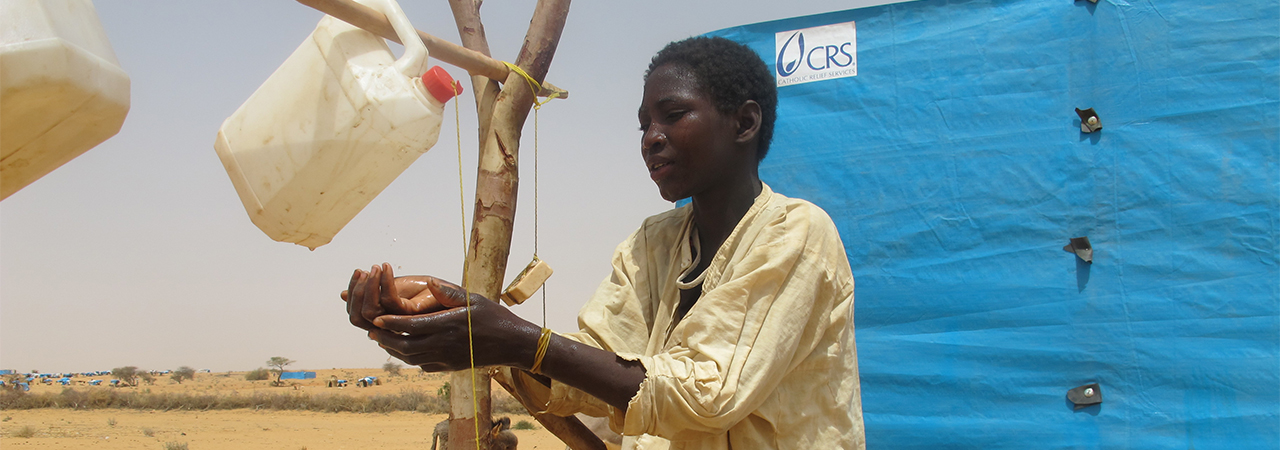

Programme d’Appui à la Sécurité Alimentaire des Ménages-Tanadin Abincin Iyali (PASAM-TAI) Program to support household food security
CRS’ PASAM-TAI program tackles food security and malnutrition in Niger through water, sanitation, and hygiene (WASH) programming. Our main approach is to promote hand-washing and the end of open defecation.
PROJECT DETAILS
Official name of project: Programme d’Appui à la Sécurité Alimentaire des Ménages-Tanadin Abincin Iyali (PASAM-TAI)
Project years: July 2012-July 2017
Country: Niger
Value of project: $39.9 million
Names of donors and partners: Donor: USAID/Food for Peace
Partners: ICRISAT, GRET, Cinéma Numérique Ambulant, Réseau des partenaires des arts vivants, CADEV/Maradi, les services techniques de l’Etat
GOALS OF THE PROJECT
The goal of the program is to reduce food insecurity and malnutrition in the Zinder and Maradi regions of Niger. We do this by promoting hand- washing with water and soap and striving to end open air defecation. We teach household members, particularly pregnant and nursing women and children under five years of age, to use appropriate health, hygiene and nutrition practices.
Another goal of the project is for households to increase their production of food for more income and their consumption for better nutrition while improving their resilience to future food insecurity or malnutrition crises.
NEED FOR THE PROJECT
One in 10 child deaths are due to diarrhea from unsafe water or poor sanitation. Gamouza village is located in Mayahi Department and has 463 inhabitants. Residents are scattered throughout the area and families are extremely poor. Local materials that could be used to make a latrine are very rare.
HOW WE DO IT
Our WASH activities include four main activities:
- Community-led total sanitation (CLTS)
- Hygiene and nutrition education in schools
- WASH-friendly school approach and the construction of school latrines
- Construction and rehabilitation of hydraulic infrastructures
Our main approach is to promote hand-washing and the end of open defecation. We do so by sponsoring plays, storytelling sessions, puppet shows and listening clubs. Children, a vital group we want to reach, participate in CRS activities at schools. The WASH-friendly schools program, for example, includes hygiene education, construction and usage of latrines, and promotion of hand-washing, among other activities.
To encourage communities that make progress based on our initial activities, we provide modern water points to help people to stop defecating outdoors and to adopt consistent hand-washing practices.
We also demonstrate the proper way to wash hands and how to create a tippy-tap, a low-tech hand-washing station that uses branches, twine and a plastic container to suspend water. With a tippy tap, people pull the twine to invert the bucket so they can wet and rinse their hands under the pouring water. This method is more hygienic than the practice of using a bucket of water on the ground that is used by many people to both wash and rinse hands.
BY THE NUMBERS
- 71 villages certified Open Defecation Free, which means the communities have abandoned the practice of open defecation and use latrines instead
- 20 borings rehabilitated and made available to the local population
- 15 wells being rehabilitated
- 3 mini-piping of potable water being constructed
- 24 school latrines being built
SUCCESS STORIES
One exciting aspect of this project is the innovation we’ve seen in the types of latrines created from village to village. We’ve seen latrines made from old tires, buckets, wood and cans. Many people have inquired how to make latrines using locally available materials, and our partner staff has advised them to ensure the latrines are durable and safe.
As soon as the Community-Led Total Sanitation initiative was launched in Gamouza, the village chief, Issoufou Abdou, age 43, set the example by designing a simple latrine and using it. The latrine is made of two 25 liter cans, entirely buried, with a cover made from a section of one of the cans. This type of latrine is made in less than an hour and costs less than $3, i.e. 12 times less than a manufactured latrine slab.
Having new latrines has become a sort of prestige in the village and individual families now want their own latrine to show off to their neighbors. In the first two years of PASAM-TAI, the communities have constructed 8,569 latrines without any subsidy from CRS.
Mariama Abdou, a single woman living alone, created a latrine all by herself. Women have mobilized to carry out a systematic sweep in their village. Because of that, a true change has been noticed in the cleanliness of the village.

